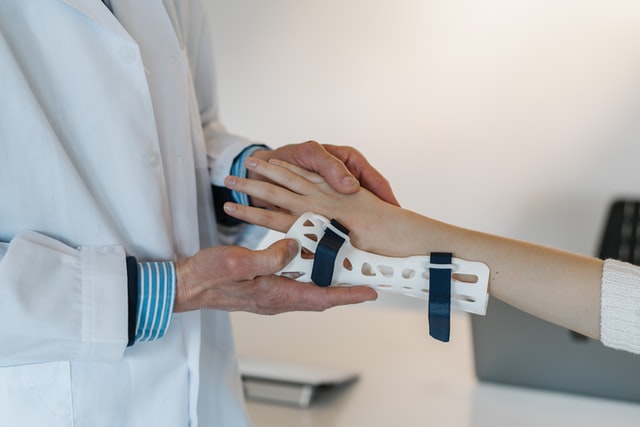Many kids lead active lifestyles, exploring different activities, engaging in their favorite sports and even playing with their friends. This also means they can be more prone to orthopedic problems at this point. Whether it be a growth abnormality, a fracture after falling off a bike or sore knees from playing too much, it’s never a pleasant experience to see your child in pain.
This is why pediatric orthopedics exists. Since children have musculoskeletal issues and needs that differ from that of an adult, they require the attention and treatment of a physician specializing in this field.
But, what is pediatric orthopedics in the first place? And what does a pediatric orthopedist do? More importantly, what should you expect at your first pediatric orthopedic appointment? We answer these questions and more below.
What Is Pediatric Orthopedics?
What Does a Pediatric Orthopedist Do?
Now that we’ve answered, “What is pediatric orthopedics?”, it also helps to understand what physicians specializing in this field actually do.
Also called pediatric orthopedic surgeons, these healthcare professionals chose to deal with children from infants to teenagers as the core of their medical practice. They have undergone specialized education to properly evaluate and treat various musculoskeletal disorders, such as:
- Limb and spine deformities (e.g., scoliosis, clubfoot, limb length differences
- Gait abnormalities
- Nerve issues
- Broken bones and torn ligaments
- Bone, joint and muscle infections
- Tendinitis and bursitis
Pediatric orthopedists can use both surgical and non-surgical remedies to treat disorders or injuries. Moreover, they know how to develop specialized treatment plans and rehabilitation programs to address each child’s unique needs.
Education and Training for Pediatric Orthopedics
Pediatric orthopedic surgeons usually undergo at least ten years of formal medical education. They have to complete a four-year study at an approved medical school before moving on to their orthopedic surgery residency program, which usually takes five years. After this, they will need to complete further subspecialty training in pediatric orthopedics.
But in addition to undergoing in-depth education in understanding and managing pediatric orthopedic conditions, these healthcare professionals have also been trained on how to make children feel relaxed and cooperative. Since kids are often not able to accurately articulate the symptoms they are feeling, pediatric orthopedists have to pick up creative ways to get the information they need to treat their patients appropriately.
Common Childhood Orthopedic Conditions
It’s not uncommon for children to experience congenital, developmental or acquired orthopedic problems, such as the following:
- Childhood fractures
- In-toeing and out-toeing
- Spinal deformities
- Limping and other gait abnormalities
- Infections of bones and joints
- Painful joints after sports activities
If you believe your child has developed any of these conditions, a pediatric orthopedist can help diagnose the problem. Moreover, they can identify the most suitable treatment options, whether a cast brace, physical therapy or surgery.
What To Expect at the Pediatric Orthopedist
Bringing your child to a pediatric orthopedist can be challenging, especially if this is your first time and you have an unwell young one in tow. While you can count on your pediatric orthopedic surgeon to know how best to work with children, knowing what to expect at your appointment can help you get the most out of the consultation.
Here are the steps you’ll usually go through:
Medical Evaluation
Here, your pediatric orthopedic surgeon will ask questions about your child’s injury or condition. This includes the symptoms they have been experiencing and when they started.
Your physician will need as much information about your child as possible, so bringing any necessary documents and explaining their medical history to the pediatric orthopedist will be helpful.
Physical Examination
A pediatric orthopedist will have your child follow simple instructions to examine their movements. They may also simply observe them as they run, play or hold certain objects, especially if your child is still nervous or reluctant to participate.
As a parent, you can help make the examination easier and more comfortable by holding your child in your lap or encouraging them to follow the doctor’s instructions.
Tests and Imaging
If necessary, your child’s pediatric orthopedic surgeon may request an x-ray, a CT scan or an MRI scan to have a better look at their bones. Casting or splinting may also be conducted for urgent cases, plus a blood draw for laboratory testing. Fortunately, you can stay with your child for most of these procedures.
Discussing the Treatment Options
Once the physician has identified your child’s musculoskeletal issue, they will discuss the various treatment options available. These could usually be wearing a cast brace, undergoing physical therapy or getting surgery.
Broken bones can usually be treated without surgical intervention, and problems like clubfoot may also be corrected with casting. But in the case that surgery is needed for your child’s orthopedic condition, rest assured that pediatric orthopedic surgeons have undergone specialized training with techniques and implants specifically designed for a child’s growing body.
Visit Georgia Bone & Joint for the Most Considerate Pediatric Orthopedic Care
Your child may encounter different musculoskeletal conditions as they grow up. Some issues may be congenital and developmental, while others may be acquired. Whatever the cause of their pain or discomfort, you can turn to the expert pediatric orthopedists at Georgia Bone & Joint for the friendliest and most attentive care for your child.
Book an appointment today! We’d love to help get your little one on the road to recovery.
